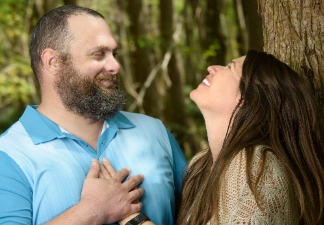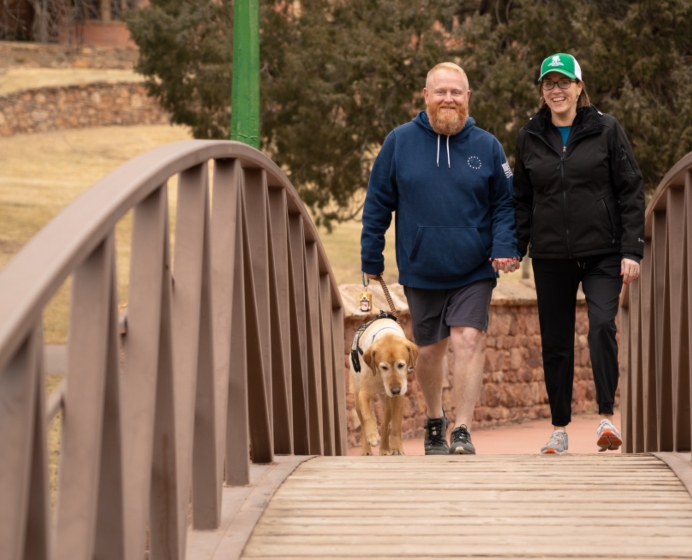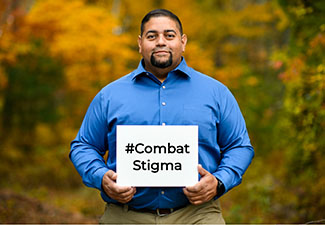Connection Saves Lives: Caring for the Caregivers

Jenna Malone didn’t realize how much her husband Issac was hurting until she walked in on him about to take his own life. Fortunately, she was able to stop him at that moment, but the fear and confusion lingered long after. However, Issac’s suicide attempt became a catalyst for them to seek help and rebuild their lives stronger than before.
Issac’s return from the military was a whirlwind of emotions for the whole family. After multiple deployments, including to Iraq and Afghanistan, Issac came home with physical injuries and other wounds Jenna couldn’t see but knew were there. While caring for him, Jenna pushed her own emotional needs aside. She didn’t realize her family was dealing with the effects of post-traumatic stress disorder (PTSD) until it was almost too late.
“It was not until about a year later that [Issac] finally had an official diagnosis of PTSD,” Jenna said. “It took us that long to realize what those symptoms were. When he got out of the military, he was still really struggling with depression and suicidal ideations.”
Jenna also didn’t realize the toll of caring for someone dealing with PTSD. Even after the diagnosis, Jenna saw their relationship unraveling, in addition to her mental health. She was overwhelmed with the responsibilities of being a caregiver, a mother, and an employee, and she felt isolated and alone.
"In 2016, I was working two jobs. He just got out of the military. We were still fighting for his benefits, and that's really when things just hit the tipping point where I started breaking down and having severe panic attacks,” Jenna said.
"I wasn't suicidal necessarily, but if this makes sense, I would have been OK if the pain and the suffering would just end.”
Jenna is not alone in her feelings as a veteran caregiver. According to the 2024 RAND Report, America’s Military & Veteran Caregivers: Hidden Heroes Emerging from the Shadows, caregivers of post-9/11 veterans are facing numerous challenges, including higher rates of depression and suicidal ideation than caregivers for other-era veterans.
Like the veterans and service members it serves, Wounded Warrior Project® (WWP) supports the unique needs of post-9/11 caregivers, which will evolve as the veterans they care for age.
The Challenge for Caregivers
WWP and the Elizabeth Dole Foundation partnered to support the launch of the 2024 RAND Report, which highlights the growing needs of military and veteran caregivers.
The RAND research shows that younger caregivers need more mental health care and financial support, as well as programming and health care approaches that more directly apply to younger veterans and their caregivers.
Additionally, the report found that many caregivers are not seeking mental health treatment for themselves, focusing exclusively on the veteran or service member they’re caring for. There can be a variety of other factors that impact reaching out for support too, such as not knowing where to go, the potential cost, and the fear of being hospitalized or prescribed unwanted medication.
That was the case for Jenna.
“[Issac] got back from Afghanistan in 2013, and I didn't notice too much with myself until probably a year later,” Jenna said. “The early signs were around the time that he was suicidal and had that suicide attempt. I started having trouble breathing and many panic attacks. I would get overwhelmed and burnt out, but it was still manageable at that time.”
Jenna kept juggling it all, unaware she was also dealing with PTSD symptoms of her own. In 2017, the Malones registered with WWP, and Jenna was able to connect with other caregivers and learned she wasn't alone in what she was feeling.
“That really helped me to start identifying some of the symptoms and triggers I was dealing with, learning skills to manage that, and building a support system to help me through it,” Jenna said.
WWP provides free mental health support for post-9/11 veterans, including their caregivers and family members. Mental health resources include the Independence Program, Project Odyssey®, WWP Talk, and referrals to outpatient and partner services to further support their mental wellness.
Realizing there were resources and help available allowed Jenna to improve her mental well-being and build a better foundation for her family.
"What I learned in my journey is that getting help for myself was actually one of the things that turned not only our marriage around but also encouraged my husband to keep going and seeking help,” Jenna said. “He saw that I was getting better with the symptoms I was having, and it made a difference for him to be like, ‘OK, maybe I can do this, too.’"
Finding Help and Hope
The Malones made an effort to improve their lives. Connecting to WWP’s free life-changing programs and resources made a big difference for their entire family.
Issac attended Operation Mend through Warrior Care Network®, a partnership between WWP and four world-renowned academic medical centers that provides improved access and personalized treatment for mental health conditions and brain injuries. Operation Mend is part of UCLA Health and offers programs customized for each warrior.
“For about five years, he just felt really stuck. I was trying to encourage him to continue trying other things because it was disappointing for him to keep trying things, and they weren't working,” Jenna said. “But then, we finally found Operation Mend. Finally, we had found something that moved the needle forward and lasted.”
Issac benefited from building connections with fellow veterans and the dedication of the partners who stood beside him through it all.
“When someone is in such a hole like my husband was, they need a support system to help and encourage them and show them that there's still hope.”
It was also time for Jenna to get the help she needed for her own mental well-being, which she placed on the back burner for too long.
“Sometimes, as a caregiver, we have to put ourselves first,” Jenna said. “I know it’s redundant, but you have to put your oxygen mask on first to be able to help others. So, caregivers need to recognize that they have to get help, too.”
Find out how WWP supports warriors and their families.
Connecting Caregivers

Veteran caregiver Jenna Malone and her family were able connect with WWP resources and programs to improve their family dynamic.
Military service is a great honor but also a profound sacrifice. It brings its own set of challenges to service members and veterans. But caregivers and family members also bear the weight, facing similar struggles and trauma, including secondary PTSD and loneliness.
“Besides veterans being super isolated, so are caregivers, and that isolation leads to depression and suicidal ideations,” Jenna said. “A lot of caregivers might feel hopeless in their situation, so providing resources for peer support and ways for them to connect with other caregivers, to have self-care, to have breaks, I think, is vital and relieves some of the stressors that come with caregiving.”
Jenna currently works for a veteran nonprofit. She is focused on her mental health and shares what she’s learned with other caregivers and family members, which is how she got help.
“That was huge for me because, for a while, I felt very isolated and like nobody understood – family, friends, coworkers, etc. So, when I finally connected with Wounded Warrior Project and did some caregiver events, it was very eye-opening for me,” Jenna said. “It made me feel like I wasn't alone, and I was able to build those relationships with others who understood what I was going through.”
Caring for a veteran you love when they’re dealing with PTSD or other mental health issues can be challenging, but it’s important that caregivers and family members understand their mental health is valuable, too.
“As [caregivers], we have to realize we’re on our own journey, and as much as we want to fix our veteran, at the end of the day, they have to want it,” Jenna said. “The more we focus on ourselves and improving ourselves and getting ourselves whole and healthy, it just improves the whole dynamic with the family.”
If you, or someone you know, needs support, you can call, text, or chat with the National Suicide Prevention Lifeline at 988 or contact the Crisis Text Line by texting "TALK" to 741741.
Contact: Paris Moulden, Public Relations, pmoulden@woundedwarriorproject.org, 904.570.7910
About the RAND Report
The 2024 RAND report, America’s Military & Veteran Caregivers: Hidden Heroes Emerging from the Shadows, is the most comprehensive study ever conducted on today’s military and veteran caregivers and their families. As a lead funder, Wounded Warrior Project® (WWP) understands that caregivers go above and beyond for warriors, and our priority is to ensure both groups live with hope and purpose.
About Wounded Warrior Project
Since 2003, Wounded Warrior Project® (WWP) has been meeting the growing needs of warriors, their families, and caregivers — helping them achieve their highest ambition. Learn more about Wounded Warrior Project.



